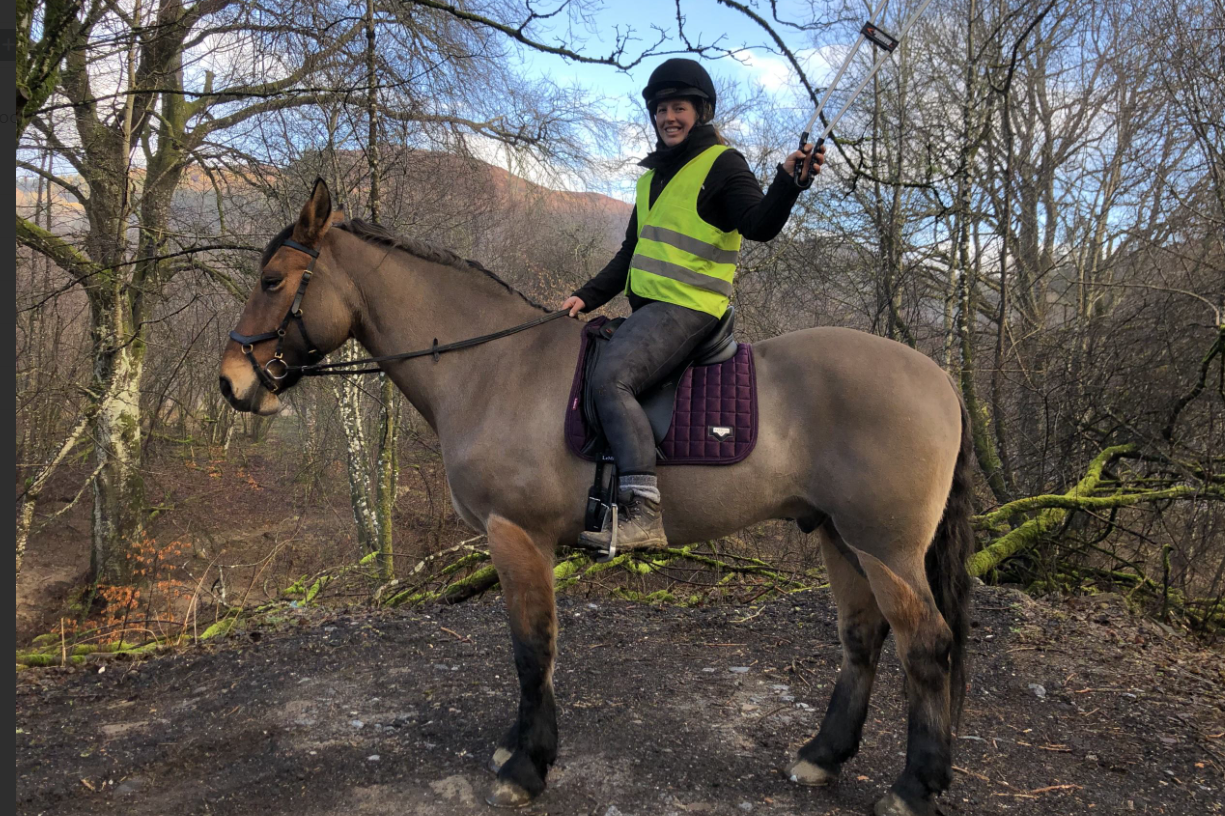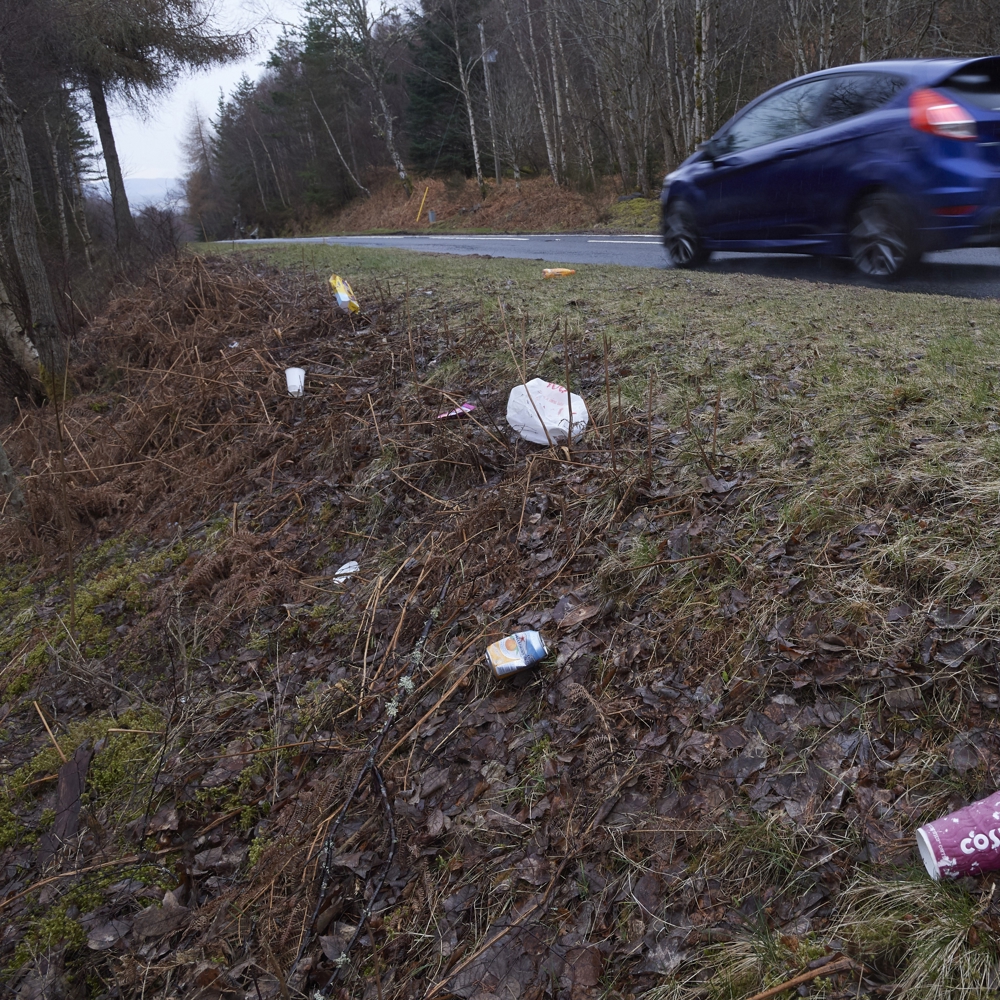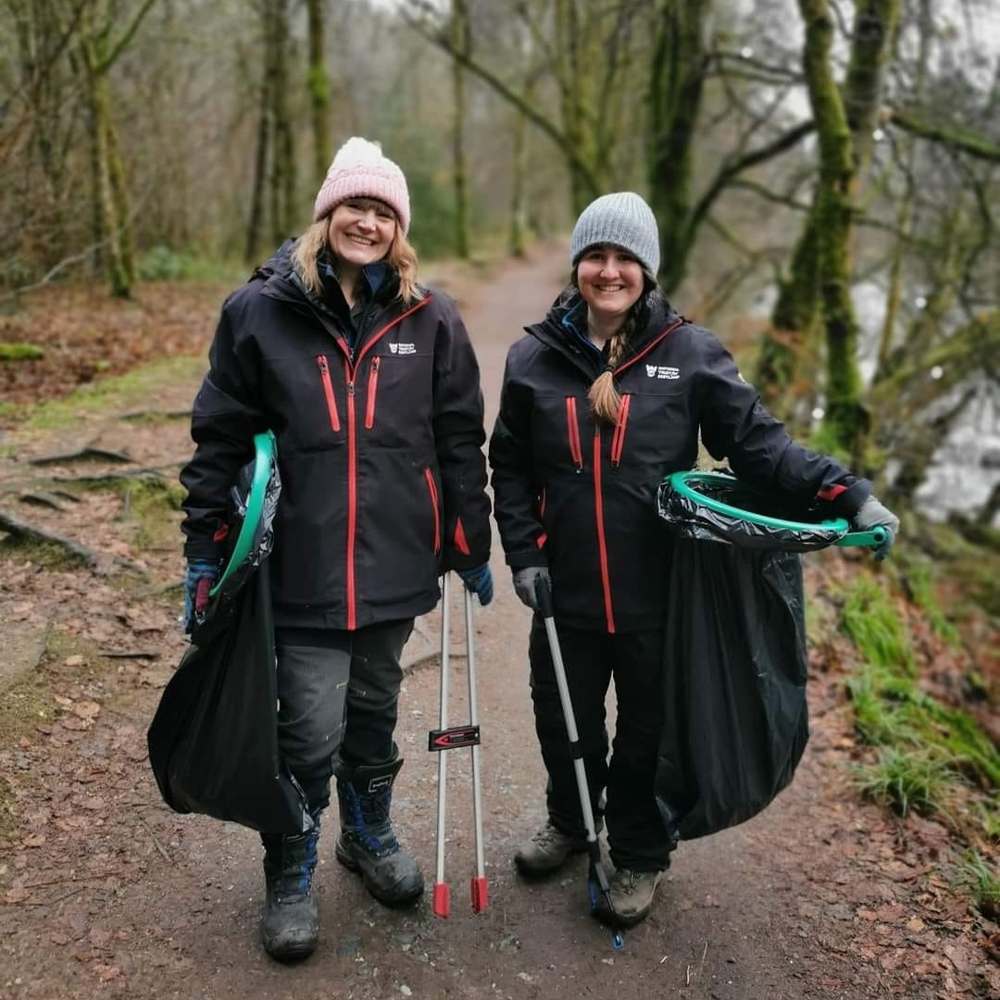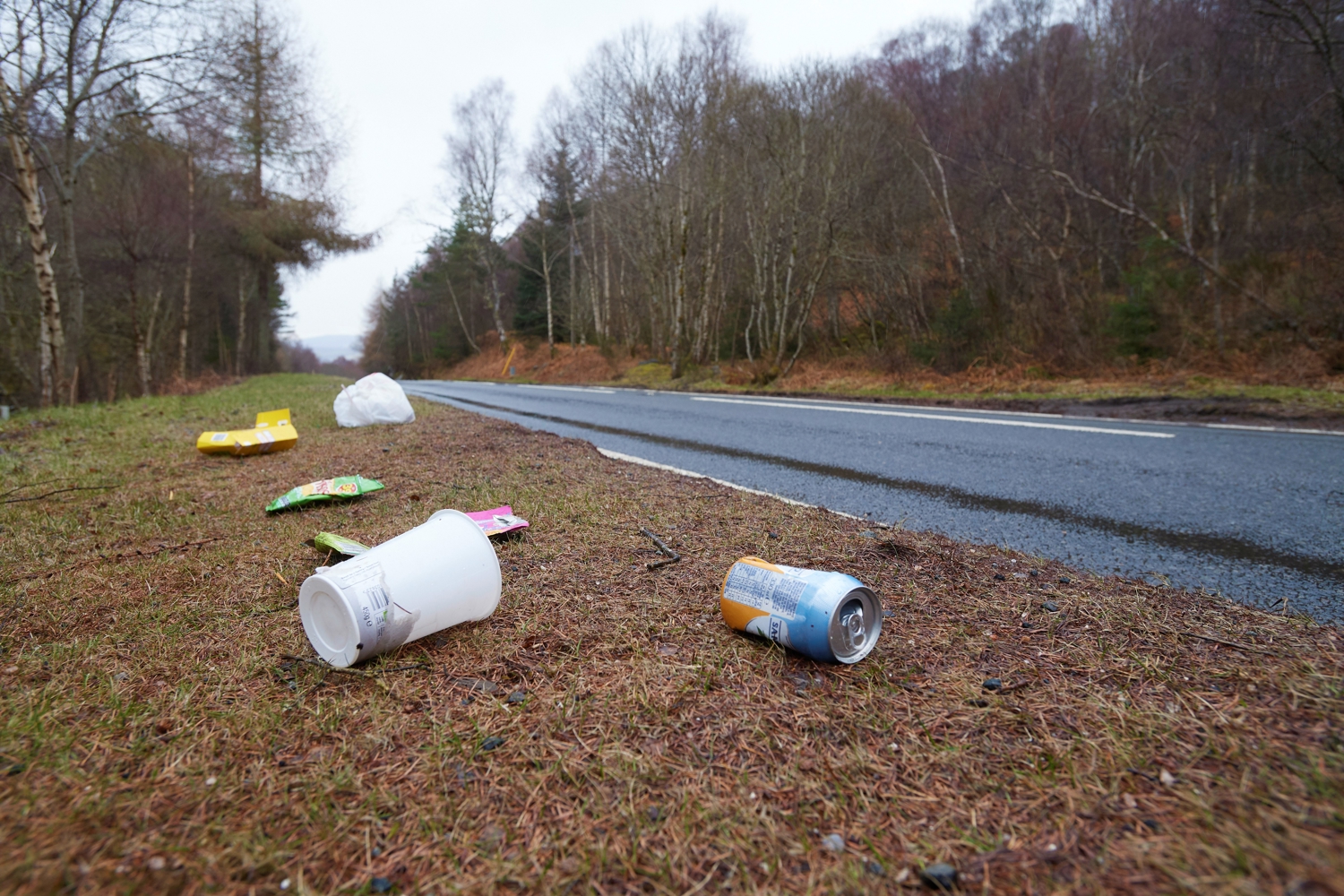As part of our long-term work to tackle roadside litter, our Campaigns Officer Carly Ramsay has been speaking to volunteers, businesses and a member of the Killiecrankie, Tummel and Fincastle Community Council to find out how roadside litter impacts them and their communities.

Roadside litter is an issue prevalent across Scotland that negatively impacts urban and rural areas, one that we have been campaigning on for more than 20 years. Anyone frustrated with roadside litter is not alone: our research has shown that nine in ten (88%) Scots see roadside litter as a problem.
Our environmental audits conducted throughout 2023/24 included surveys of 1,286 road sites, 55% of which were found to have litter present. The most common litter type found on roads during audits was smoking related (26%). However, when considered as a category, food and drink litter accounts for 44% of litter on surveyed roads.
Furthermore, our data shows that on rural roads the top three littered items are drinks (24%), smoking (22%) and paper (22%).
Unfortunately, we have become accustomed to seeing roadside litter, but we might not always be aware of the unique issues it brings to rural areas. This type of litter not only spoils the aesthetic of our beautiful natural environment, but it also has wider emotional, environmental and financial impacts on the local communities and wildlife that are burdened with it.
Scotland is undoubtedly a place of exceptional natural beauty, rich history and heritage, and we should be proud to welcome visitors to experience what Scotland has to offer. Many rural places in Scotland are key tourist destinations and are dependent on the income generated by visitors; however, they are often blighted by roadside litter and the challenges it brings.
In 2024 we launched a Roadside Litter campaign in Perth and Kinross, with both an urban and a rural focus. As part of this campaign, we wanted to find out more and highlight the different ways roadside litter affects the rural community and really understand the impact it has. To do this, we sought input from volunteers, business owners and community council members from the village of Killiecrankie on topics such as safety, dangers to animals and the environment, and the impact on local businesses.
Litter is not something we want to greet visitors with, but it is something that they will remember. Ninety-one per cent of people across the country agree that litter creates a negative impression of Scotland.
Litter is an eyesore. That can affect visitors’ appreciation of Killiecrankie’s beautiful natural heritage and that must have a knock-on effect on businesses here. Tourism suffers if a celebrated place does not live up to its picture postcard image.
Killiecrankie, Fincastle and Tummel Community Council


Safety
The careless act of throwing litter from a moving vehicle not only causes an eyesore, but it's also a safety concern. Prevention is key as roadside litter is particularly difficult, dangerous and costly to clear up.
Not only does it look bad, but it can also cause some safety hiccups, like blocked drains leading to mini lakes and rogue wrappers doing the cha-cha on our roads. A fantastic crew of volunteers is out there battling the litter, but let’s be honest — it’s a dangerous and mucky job and we should be channelling our love for our community into more positive activities.
The Jacobite Cafe
Economic
Roadside litter is not only dangerous to clean up, but also costly. Scotland’s litter and flytipping problem costs an estimated £1m every week. Although it is everyone’s responsibility to keep our country, land and water clean and clear of litter, the financial burden of litter affects local authorities, landowners and local businesses. It costs Perth & Kinross Council over £2 million per annum to clear up litter.
“Whilst littering has an obvious impact on the environment and wildlife, many fail to see the economic and emotional impact it has on small rural areas such as Killiecrankie, Pitlochry and Blair Atholl. These are places that thrive due to toursits who come for the beautiful natural scenery, and people who come and make a home here for the same reasons. By spoiling the aesthics by littering, people are ruining one of the key reasons that people come”. - Killiecrankie House
Whilst littering has an obvious impact on the environment and wildlife, many fail to see the economic and emotional impact it has on small rural areas such as Killiecrankie, Pitlochry and Blair Atholl. These are places that thrive due to toursits who come for the beautiful natural scenery, and people who come and make a home here for the same reasons. By spoiling the aesthics by littering, people are ruining one of the key reasons that people come.
Killiecrankie House
Danger to animals
Killicrankie is home to a variety of wildlife and animals are also in danger from litter found both near the roadside and in adjacent fields, woodlands and riverside. Landowners can also be affected by litter by way of having to clear litter from their land, as well as suffer costs associated with the harm to livestock.
Killiecrankie, Fincastle and Tummel Community Council's Loretta McLaughlan said: “Litter is a danger to wildlife, one of Killiecrankie’s main assets. We have red squirrels, pine martens, otters, salmon and an amazing variety of birds. Pets, livestock and aquatic animals are at risk when litter either blows into fields or, worse, is discarded in an enclosed area or by the river."
Litter not only poses a threat to land animals, but also to aquatic life. Killiecrankie is well known for its history with the Soldier's Leap known as the place where a Redcoat soldier fleed the Jacobites by leaping 18ft across the raging River Garry. Unfortunately, despite the River Garry being a prominent feature of the village and a historic place of Scottish heritage and culture, it’s not undisturbed from litter.
Most of the litter we find here is dropped on the roadside, but it ends up down in the woodland and river habitats that we try so hard to protect. Plastics break up and cause pollution in the beautiful River Garry, and find their way into the food chain, affecting many different species.
National Trust for Scotland Ranger
Killiecrankie is home to the 1689 battlefield site. The A9 runs through the centre of the battle field, where roadside litter can impact nearby wildlife.
Stew Hall of Soldiers of Killiecrankie said: “Along with the more common wildlife frequenting the battlefield such as buzzards and deer, we also have several varieties of owl, adders, mice, badger and voles."
Not only does litter harm wildlife, but it also has an impact on livestock and domesticated animals. Litter does not only lure animals to the roadside, putting them in danger, but it can also be thrown directly or blown into nearby fields. One of the local businesses that has to deal with consequences of roadside litter is Riders of the Storm Equestrian Academy.
Kirsty McWilliam, the academy's founder, said: “It saddens me that we find so much rubbish thrown out of windows into the horse fields. I pick up cans that can injure horses [by] cutting them and food containers that, if ingested, can cause serious damage and distress to the horses."

Looking ahead, the core issue here is our societal reliance on single-use items, disposable packaging and our on-the-go culture. Despite the cleaning up effort made by local authorities, road operators and local volunteers, it is an issue that is persistent.
To tackle this, we need a combination of preventative behaviour change campaigns to educate and engage culprits, improved infrastructure to make doing the right thing convenient and effective enforcement.
Our refreshed Anti-Roadside Litter Campaign in Perth and Kinross has allowed us to re-engage with the public and highlight the persistent nature of this issue, raise levels of awareness both in an urban and rural setting, and trial new messaging to tackle the behaviour.
The message of our campaign continues to be based on the simple act of holding onto your litter until you can dispose of it responsibly or #TakeItHome. The message is a simple one, but effective. Working across multiple sectors and organisations was key to raising awareness and taking action in Perth and Kinross, with collaboration involving Perth and Kinross Council, Killiecrankie, Fincastle and Tummel Community Council, Starbucks and Enterprise Rent-A-Car.
As with any complex and persistent issue there is no single solution. A combination of education and engagement, optimised infrastructure and effective enforcement over a substantial period of time is required. With sustained action and collaboration, it is possible to put an end to the blight of litter on our roads.
Want to get involved in litter picking? The next event in Killiecrankie is on Sunday 23 March at 1.30pm at the Killiecrankie Community Centre. If you are not nearby, check out our Clean Up Map to find a #SpringCleanScotland event near you.
We support the 



